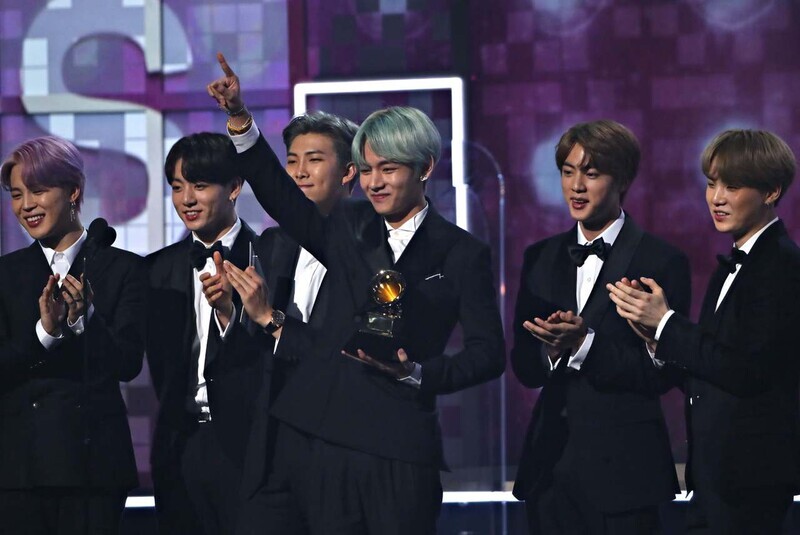hankyoreh
Links to other country sites 다른 나라 사이트 링크
[Column] The meaning behind the language of K-pop

As the cold weather sets in, the number of COVID-19 cases is rapidly increasing. While spending more time at home, I’ve been using Zoom to watch lectures at various universities; I hardly miss any lectures about Korea. Many of those lectures are connected to K-pop, which is a testament to its popularity.
Along with reflecting on the fact that I haven’t taken much interest in K-pop until now, I started thinking about how K-pop could be explained in terms of sociolinguistics.
Rock and roll was a “new sound” that came to sudden popularity in the 1950s in the US and the UK, countries that had established a new world order following their victory in World War II. But rock and roll wasn’t just about novelty: it was obviously fueled by resistance against the conservatism of the old generation.
Rock and roll and challenging traditionOther factors contributing to rock and roll’s rapid spread were ubiquitous television ownership and the development of vinyl records, which made music much more accessible. The popular music industry carved out a space for itself not only in the US and UK, but around the world, with rock and roll in the vanguard of its hegemony.
The language of rock and roll was none other than English. As a result, not only the English language but also the culture of the Anglosphere came to pervade pop and pop culture as a whole. Music that was fashionable in the English-speaking world became popular outside the Anglosphere, even if lyrics were translated into the local language.
Korea was no exception. Just off the top of my head, there was Shin Jung-hyeon and Sanulrim.

As rock and roll did long ago, K-pop is swiftly spreading to places around the globe. But what language does it use?
It’s rare for K-pop lyrics to be entirely in Korean. Take the lyrics of BTS, a group that has built a worldwide following. Many BTS songs feature a mixture of Korean and English lyrics.
Psy’s song “Gangnam Style,” which was a huge hit years before BTS, also sprinkled English expressions into Korean lyrics.
The way the languages are combined depends on the song. Some songs add English words to Korean sentences; others do just the opposite. Sometimes Korean sentences are sung back in English, and sometimes only the chorus or the sing-along section are in English.
Through these permutations of the language of K-pop, people around the world are eager to listen to the Korean language for the first time in history. Just a decade ago, Korean was widely seen as the language of a small country in Asia. But now Korean has become one of the main languages of popular music, along with English.
Just as rock and roll did long ago, the new music sometimes contains a spirit of resistance to the conservatism of the old generation. The Korean lyrics that fill the air because of K-pop seem like a kind of counterattack against English, which has dominated the global pop scene for so long.

Here in the US, where I live, I frequently see BTS in action. During interviews with foreign media and promotional videos, the person who does most of the talking is group leader RM (Kim Nam-joon). The other members of the group sometimes only briefly introduce themselves and crack a joke or two.
But each member of the group has a distinct personality. While they don’t emulate the pronunciation of a native speaker, they don’t have a distinctly Korean accent, either. Sometimes they’ll only say a few sentences or words, and sometimes they speak in Korean. Their laughter and body language are also quite colorful.
Psy spoke in very fluent English whenever he was interviewed, but BTS seems to be putting on a vibrant show in the language of K-pop.
So where does that difference originate? I’d point to a change in attitudes toward English that occurred in the 2010s.
Since Psy had spent time studying in the US, it seems natural that he’d be good at English. But none of the BTS members have ever studied overseas. RM learned English as a hobby while in Korea.
While none of the BTS members reject English, they’re more relaxed about it, only using it occasionally, as needed. Since their work as artists is focused on music and dance, they don’t seem to think it’s so crucial to be fluent in English. If anything, using the “language of K-pop” benefits their brand image.
English-speaking world taken down a notch
Listening to the “language of K-pop,” I get the impression that the English-speaking world, which had smugly assumed that it would forever hold hegemony over popular culture, has been taken down a notch or two.
K-pop may have been created in Korea, but it consists not only of Korean but of other languages that it’s also adept at incorporating. It sometimes feels as if that hybrid language is emerging as a new powerhouse in popular culture.
I suspect this is the sensibility that languages of the future will need in an age when the boundaries between nations, races and genders are growing more fluid.
If K-pop can exert even more influence on popular culture as a whole than it does right now, perhaps that will enable K-pop not only to open up a new horizon for popular culture but also to turn into a new language of the future, a language that allows unlimited self-expression.
Those are the possibilities I ponder while watching BTS; I hope they come true.

By Robert Fouser, linguist
Please direct comments or questions to [english@hani.co.kr]

Editorial・opinion
![[Column] Season 2 of special prosecutor probe may be coming to Korea soon [Column] Season 2 of special prosecutor probe may be coming to Korea soon](https://flexible.img.hani.co.kr/flexible/normal/500/300/imgdb/original/2024/0426/3317141030699447.jpg) [Column] Season 2 of special prosecutor probe may be coming to Korea soon
[Column] Season 2 of special prosecutor probe may be coming to Korea soon![[Column] Park Geun-hye déjà vu in Yoon Suk-yeol [Column] Park Geun-hye déjà vu in Yoon Suk-yeol](https://flexible.img.hani.co.kr/flexible/normal/500/300/imgdb/original/2024/0424/651713945113788.jpg) [Column] Park Geun-hye déjà vu in Yoon Suk-yeol
[Column] Park Geun-hye déjà vu in Yoon Suk-yeol- [Editorial] New weight of N. Korea’s nuclear threats makes dialogue all the more urgent
- [Guest essay] The real reason Korea’s new right wants to dub Rhee a founding father
- [Column] ‘Choson’: Is it time we start referring to N. Korea in its own terms?
- [Editorial] Japan’s rewriting of history with Korea has gone too far
- [Column] The president’s questionable capacity for dialogue
- [Column] Are chaebol firms just pizza pies for families to divvy up as they please?
- [Column] Has Korea, too, crossed the Rubicon on China?
- [Correspondent’s column] In Japan’s alliance with US, echoes of its past alliances with UK
Most viewed articles
- 1‘We must say no’: Seoul defense chief on Korean, USFK involvement in hypothetical Taiwan crisis
- 2Is Japan about to snatch control of Line messenger from Korea’s Naver?
- 3[Editorial] Korea’s surprise Q1 growth requires objective assessment, not blind fanfare
- 4Division commander ordered troops to enter raging flood waters before Marine died, survivor says
- 5No good, very bad game for Korea puts it out of Olympics for first time since 1988
- 6Korea’s 1.3% growth in Q1 signals ‘textbook’ return to growth, says government
- 7[Reportage] On US campuses, student risk arrest as they call for divestment from Israel
- 8N. Korean delegation’s trip to Iran shows how Pyongyang is leveraging ties with Moscow
- 9Flying “new right” flag, Korea’s Yoon Suk-yeol charges toward ideological rule
- 10[Column] Park Geun-hye déjà vu in Yoon Suk-yeol